| Listing 1 - 7 of 7 |
Sort by
|
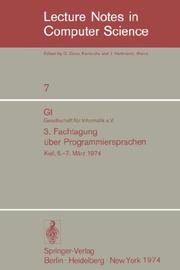
ISBN: 3540066667 Year: 1974 Publisher: Berlin Springer
Abstract | Keywords | Export | Availability | Bookmark
 Loading...
Loading...Choose an application
- Reference Manager
- EndNote
- RefWorks (Direct export to RefWorks)
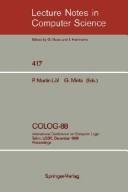
ISBN: 0387523359 3540523359 354046963X 9783540523352 Year: 1990 Volume: vol 417 Publisher: Berlin : Springer-Verlag,
Abstract | Keywords | Export | Availability | Bookmark
 Loading...
Loading...Choose an application
- Reference Manager
- EndNote
- RefWorks (Direct export to RefWorks)
This volume contains several invited papers as well as a selection of the other contributions. The conference was the first meeting of the Soviet logicians interested in com- puter science with their Western counterparts. The papers report new results and techniques in applications of deductive systems, deductive program synthesis and analysis, computer experiments in logic related fields, theorem proving and logic programming. It provides access to intensive work on computer logic both in the USSR and in Western countries.
Computer science --- Logic, Symbolic and mathematical --- Mathematics --- Congresses. --- -Logic, Symbolic and mathematical --- -681.3*D12 --- 681.3*D24 --- 681.3*F4 --- 681.3*I23 --- Algebra of logic --- Logic, Universal --- Mathematical logic --- Symbolic and mathematical logic --- Symbolic logic --- Algebra, Abstract --- Metamathematics --- Set theory --- Syllogism --- Informatics --- Science --- -Congresses --- Congresses --- Automatic programming--See also {681.3*I22} --- Program verification: assertion checkers; correctness proofs; reliability; validation (Software engineering)--See also {681.3*F31} --- Mathematical logic and formal languages (Theory of computation) --- Deduction and theorem proving: answer/reason extraction; reasoning; resolution; metatheory; mathematical induction; logic programming (Artificial intelligence) --- 681.3*I23 Deduction and theorem proving: answer/reason extraction; reasoning; resolution; metatheory; mathematical induction; logic programming (Artificial intelligence) --- 681.3*F4 Mathematical logic and formal languages (Theory of computation) --- 681.3*D24 Program verification: assertion checkers; correctness proofs; reliability; validation (Software engineering)--See also {681.3*F31} --- 681.3*D12 Automatic programming--See also {681.3*I22} --- 681.3*D12 --- Mathematics&delete& --- Information theory. --- Logic, Symbolic and mathematical. --- Computer science. --- Artificial intelligence. --- Theory of Computation. --- Mathematical Logic and Foundations. --- Philosophy of Science. --- Mathematical Logic and Formal Languages. --- Artificial Intelligence. --- Programming Techniques. --- Philosophy. --- Normal science --- Philosophy of science --- Communication theory --- Communication --- Cybernetics --- AI (Artificial intelligence) --- Artificial thinking --- Electronic brains --- Intellectronics --- Intelligence, Artificial --- Intelligent machines --- Machine intelligence --- Thinking, Artificial --- Bionics --- Cognitive science --- Digital computer simulation --- Electronic data processing --- Logic machines --- Machine theory --- Self-organizing systems --- Simulation methods --- Fifth generation computers --- Neural computers --- Computer science - Mathematics - Congresses --- Logic, Symbolic and mathematical - Congresses
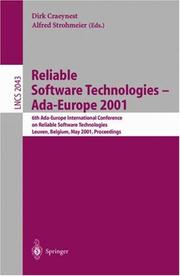
ISBN: 3540421238 9783540421238 3540451366 Year: 2001 Volume: 2043 Publisher: Berlin, Heidelberg : Springer Berlin Heidelberg : Imprint: Springer,
Abstract | Keywords | Export | Availability | Bookmark
 Loading...
Loading...Choose an application
- Reference Manager
- EndNote
- RefWorks (Direct export to RefWorks)
The Sixth International Conference on Reliable Software Technologies, Ada- Europe 2001, took place in Leuven, Belgium, May 14-18, 2001. It was sponsored by Ada-Europe, the European federation of national Ada societies, in cooperation with ACM SIGAda, and it was organized by members of the K.U. Leuven and Ada- Belgium. This was the 21st consecutive year of Ada-Europe conferences and the sixth year of the conference focusing on the area of reliable software technologies. The use of software components in embedded systems is almost ubiquitous: planes fly by wire, train signalling systems are now computer based, mobile phones are digital devices, and biological, chemical, and manufacturing plants are controlled by software, to name only a few examples. Also other, non-embedded, mission-critical systems depend more and more upon software. For these products and processes, reliability is a key success factor, and often a safety-critical hard requirement. It is well known and has often been experienced that quality cannot be added to software as a mere afterthought. This also holds for reliability. Moreover, the reliability of a system is not due to and cannot be built upon a single technology. A wide range of approaches is needed, the most difficult issue being their purposeful integration. Goals of reliability must be precisely defined and included in the requirements, the development process must be controlled to achieve these goals, and sound development methods must be used to fulfill these non-functional requirements.
681.3*D14 --- 681.3*D15 --- Ada (Computer program language) --- 681.3*D12 --- 681.3*D13 --- 681.3*D2 --- Programming languages (Electronic computers) --- Sequential programming --- Software: object-oriented programming --- Automatic programming--See also {681.3*I22} --- Concurrent programming --- Software engineering: protection mechanisms; standards--See also {681.3*K63}; {681.3*K51} --- Computer Science --- Engineering & Applied Sciences --- 681.3*D2 Software engineering: protection mechanisms; standards--See also {681.3*K63}; {681.3*K51} --- 681.3*D13 Concurrent programming --- 681.3*D12 Automatic programming--See also {681.3*I22} --- 681.3*D15 Software: object-oriented programming --- 681.3*D14 Sequential programming --- Computer science. --- Computer communication systems. --- Special purpose computers. --- Software engineering. --- Computer programming. --- Programming languages (Electronic computers). --- Computer Science. --- Software Engineering/Programming and Operating Systems. --- Programming Languages, Compilers, Interpreters. --- Software Engineering. --- Programming Techniques. --- Computer Communication Networks. --- Special Purpose and Application-Based Systems. --- Computer languages --- Computer program languages --- Computer programming languages --- Machine language --- Electronic data processing --- Languages, Artificial --- Computers --- Electronic computer programming --- Electronic digital computers --- Programming (Electronic computers) --- Coding theory --- Computer software engineering --- Engineering --- Special purpose computers --- Communication systems, Computer --- Computer communication systems --- Data networks, Computer --- ECNs (Electronic communication networks) --- Electronic communication networks --- Networks, Computer --- Teleprocessing networks --- Data transmission systems --- Digital communications --- Electronic systems --- Information networks --- Telecommunication --- Cyberinfrastructure --- Network computers --- Informatics --- Science --- Programming --- Distributed processing --- Ada (Computer program language) - Congresses
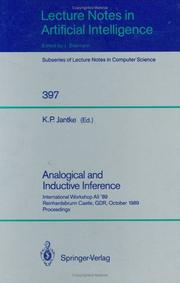
ISBN: 3540517340 0387517340 354046798X 9780387517346 9783540517344 Year: 1989 Volume: 397 Publisher: Berlin New York Paris Tokyo Springer
Abstract | Keywords | Export | Availability | Bookmark
 Loading...
Loading...Choose an application
- Reference Manager
- EndNote
- RefWorks (Direct export to RefWorks)
Artificial intelligence. Robotics. Simulation. Graphics --- Analogy --- -Artificial intelligence --- -Inference --- -Reasoning --- -681.3*D12 --- 681.3*I22 --- 681.3*I23 --- 681.3*I26 --- Argumentation --- Ratiocination --- Reason --- Thought and thinking --- Judgment (Logic) --- Logic --- Ampliative induction --- Induction, Ampliative --- Inference (Logic) --- Reasoning --- AI (Artificial intelligence) --- Artificial thinking --- Electronic brains --- Intellectronics --- Intelligence, Artificial --- Intelligent machines --- Machine intelligence --- Thinking, Artificial --- Bionics --- Cognitive science --- Digital computer simulation --- Electronic data processing --- Logic machines --- Machine theory --- Self-organizing systems --- Simulation methods --- Fifth generation computers --- Neural computers --- Knowledge, Theory of --- Congresses --- Automatic programming--See also {681.3*I22} --- Automatic programming: automatic analysis of algorithms; program modification; program synthesis; program transformation; program verification (Artificialintelligence)--See also {681.3*D12}; {681.3*F31} --- Deduction and theorem proving: answer/reason extraction; reasoning; resolution; metatheory; mathematical induction; logic programming (Artificial intelligence) --- Learning: analogies; concept learning; induction; knowledge acquisition; language acquisition; parameter learning (Artificial intelligence)--See also {681.3*K32} --- Artificial intelligence --- Inference --- Congresses. --- 681.3*I26 Learning: analogies; concept learning; induction; knowledge acquisition; language acquisition; parameter learning (Artificial intelligence)--See also {681.3*K32} --- 681.3*I23 Deduction and theorem proving: answer/reason extraction; reasoning; resolution; metatheory; mathematical induction; logic programming (Artificial intelligence) --- 681.3*I22 Automatic programming: automatic analysis of algorithms; program modification; program synthesis; program transformation; program verification (Artificialintelligence)--See also {681.3*D12}; {681.3*F31} --- 681.3*D12 Automatic programming--See also {681.3*I22} --- 681.3*D12 --- Artificial intelligence. --- Computer science. --- Logic design. --- Logic, Symbolic and mathematical. --- Artificial Intelligence. --- Programming Techniques. --- Logics and Meanings of Programs. --- Mathematical Logic and Foundations. --- Algebra of logic --- Logic, Universal --- Mathematical logic --- Symbolic and mathematical logic --- Symbolic logic --- Mathematics --- Algebra, Abstract --- Metamathematics --- Set theory --- Syllogism --- Design, Logic --- Design of logic systems --- Digital electronics --- Electronic circuit design --- Logic circuits --- Switching theory --- Informatics --- Science --- Learning
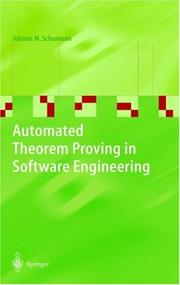
ISBN: 3540679898 9783540679899 Year: 2001 Publisher: Berlin Springer
Abstract | Keywords | Export | Availability | Bookmark
 Loading...
Loading...Choose an application
- Reference Manager
- EndNote
- RefWorks (Direct export to RefWorks)
Software engineering --- Automatic theorem proving --- Software engineering. --- Automatic theorem proving. --- 681.3*I22 --- 681.3*D24 --- 681.3*D12 --- 681.3*F31 --- 681.3*F41 --- 681.3*C22 --- 681.3*D46 --- 681.3*D213 --- Automatic programming: automatic analysis of algorithms; program modification; program synthesis; program transformation; program verification (Artificialintelligence)--See also {681.3*D12}; {681.3*F31} --- Program verification: assertion checkers; correctness proofs; reliability; validation (Software engineering)--See also {681.3*F31} --- Automatic programming--See also {681.3*I22} --- Specifying anf verifying and reasoning about programs: assertions; invariants; mechanical verification; pre- and post-conditions (Logics and meanings of programs)--See also {681.3*D21}; {681.3*D24}; {681.3*D31}; {681.3*E1} --- Mathematical logic: computability theory; computational logic; lambda calculus; logic programming; mechanical theorem proving; model theory; proof theory;recursive function theory--See also {681.3*F11}; {681.3*I22}; {681.3*I23} --- Network protocols: protocol architecture; protocol verification --- Security and protection: access controls; authentication; cryptographic controls; information flow controls; security kernels; verification (Operating systems) --- Reusable software: domain engineering; reusable libraries; reuse models --- 681.3*D46 Security and protection: access controls; authentication; cryptographic controls; information flow controls; security kernels; verification (Operating systems) --- 681.3*C22 Network protocols: protocol architecture; protocol verification --- 681.3*F41 Mathematical logic: computability theory; computational logic; lambda calculus; logic programming; mechanical theorem proving; model theory; proof theory;recursive function theory--See also {681.3*F11}; {681.3*I22}; {681.3*I23} --- 681.3*F31 Specifying anf verifying and reasoning about programs: assertions; invariants; mechanical verification; pre- and post-conditions (Logics and meanings of programs)--See also {681.3*D21}; {681.3*D24}; {681.3*D31}; {681.3*E1} --- 681.3*D12 Automatic programming--See also {681.3*I22} --- 681.3*D24 Program verification: assertion checkers; correctness proofs; reliability; validation (Software engineering)--See also {681.3*F31} --- 681.3*I22 Automatic programming: automatic analysis of algorithms; program modification; program synthesis; program transformation; program verification (Artificialintelligence)--See also {681.3*D12}; {681.3*F31} --- Computer software engineering --- Engineering --- Automated theorem proving --- Theorem proving, Automated --- Theorem proving, Automatic --- Artificial intelligence --- Proof theory
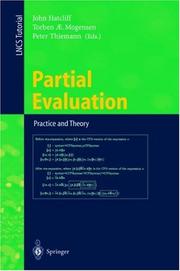
ISBN: 3540667105 9783540667100 9786610956531 1280956534 3540470182 Year: 1999 Volume: 1706 Publisher: Berlin, Germany : Springer,
Abstract | Keywords | Export | Availability | Bookmark
 Loading...
Loading...Choose an application
- Reference Manager
- EndNote
- RefWorks (Direct export to RefWorks)
As the complexity of software increases, researchers and practicioners continue to seek better techniques for engineering the construction of evolution of software. Partial evaluation is an attractive technology for modern software construction since it provides automatic tools for software specialization and is based on rigorous semantic foundations. This book is based on a school held at DIKU Copenhagen, Denmark in summer 1998 during which leading researchers summarized the state of the art in partial evaluation. The lectures presented survey the foundations of partial evaluation in a clear and rigorous manner and practically introduce several existing partial evaluators with numerous examples. The second part of the book is devoted to more sophisticated theoretical aspects, advances systems and applications, and highlights open problems and challenges. The book is ideally suited for advanced courses and for self study.
Computer software --- -681.3*D12 --- 681.3*D2 --- 681.3*D31 --- 681.3*D34 --- 681.3*F3 --- 681.3*F3 Logics and meanings of programs (Theory of computation) --- Logics and meanings of programs (Theory of computation) --- 681.3*D34 Processors: code generation compilers interpreters optimization parsing preprocessors run-time environments translator writing systems and compilergenerators (Programming languages) --- Processors: code generation compilers interpreters optimization parsing preprocessors run-time environments translator writing systems and compilergenerators (Programming languages) --- 681.3*D31 Formal definitions and theory: semantics syntax (Programming languages)--See also {681.3*D21} {681.3*F31} {681.3*F32} {681.3*F42} {681.3*F43} --- Formal definitions and theory: semantics syntax (Programming languages)--See also {681.3*D21} {681.3*F31} {681.3*F32} {681.3*F42} {681.3*F43} --- 681.3*D2 Software engineering: protection mechanisms standards--See also {681.3*K63} {681.3*K51} --- Software engineering: protection mechanisms standards--See also {681.3*K63} {681.3*K51} --- 681.3*D12 Automatic programming--See also {681.3*I22} --- Automatic programming--See also {681.3*I22} --- Software, Computer --- Computer systems --- Evaluation --- Evaluation. --- Computer software -- Evaluation. --- Computer systems -- Evaluation. --- ADP systems (Computer systems) --- Computing systems --- Systems, Computer --- Computer science. --- Software engineering. --- Computer programming. --- Programming languages (Electronic computers). --- Computer Science. --- Software Engineering/Programming and Operating Systems. --- Programming Languages, Compilers, Interpreters. --- Programming Techniques. --- 681.3*D34 Processors: code generation; compilers; interpreters; optimization; parsing; preprocessors; run-time environments; translator writing systems and compilergenerators (Programming languages) --- Processors: code generation; compilers; interpreters; optimization; parsing; preprocessors; run-time environments; translator writing systems and compilergenerators (Programming languages) --- 681.3*D31 Formal definitions and theory: semantics; syntax (Programming languages)--See also {681.3*D21}; {681.3*F31}; {681.3*F32}; {681.3*F42}; {681.3*F43} --- Formal definitions and theory: semantics; syntax (Programming languages)--See also {681.3*D21}; {681.3*F31}; {681.3*F32}; {681.3*F42}; {681.3*F43} --- 681.3*D2 Software engineering: protection mechanisms; standards--See also {681.3*K63}; {681.3*K51} --- Software engineering: protection mechanisms; standards--See also {681.3*K63}; {681.3*K51} --- Computer languages --- Computer program languages --- Computer programming languages --- Machine language --- Electronic data processing --- Languages, Artificial --- Computers --- Electronic computer programming --- Electronic digital computers --- Programming (Electronic computers) --- Coding theory --- Computer software engineering --- Engineering --- Informatics --- Science --- Programming --- Electronic systems --- Cyberinfrastructure --- Computer software - Evaluation --- -Evaluation
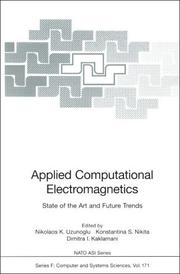
ISBN: 354065819X 3642640591 3642596290 Year: 2000 Publisher: Berlin Springer
Abstract | Keywords | Export | Availability | Bookmark
 Loading...
Loading...Choose an application
- Reference Manager
- EndNote
- RefWorks (Direct export to RefWorks)
@EOI: AEI rEOMETPEI Epigram of the Academy of Plato in Athens Electromagnetism, the science of forces arising from Amber (HAEKTPON) and the stone of Magnesia (MArNHLIA), has been the fOWldation of major scientific breakthroughs, such as Quantum Mechanics and Theory of Relativity, as well as most leading edge technologies of the twentieth century. The accuracy of electromagnetic fields computations for engineering purposes has been significantly improved during the last decades, due to the deVelopment of efficient computational techniques and the availability of high performance computing. The present book is based on the contributions and discussions developed during the NATO Advanced Study Institute on Applied Computational Electromagnetics: State of the Art and Future Trends, which has taken place in Hellas, on the island of Samos, very close to the birthplace of Electromagnetism. The book covers the fundamental concepts, recent developments and advanced applications of Integral Equation and Metliod of Moments Techniques, Finite Element and BOWldary Element Methods, Finite Difference Time Domain and Transmission Line Methods. Furthermore, topics related to Computational Electromagnetics, such as Inverse Scattering, Semi-Analytical Methods and Parallel Processing Techniques are included. The collective presentation of the principal computational electromagnetics techniques, developed to handle diverse challenging leading edge technology problems, is expected to be useful to researchers and postgraduate students working in various topics of electromagnetic technologies.
681.3*C0 --- 681.3*C1 --- 681.3*D12 --- 681.3*D24 --- 681.3*F31 --- 681.3*C1 Processor architectures (Computer systems organization) --- Processor architectures (Computer systems organization) --- 681.3*F31 Specifying anf verifying and reasoning about programs: assertions invariants mechanical verification pre- and post-conditions (Logics and meanings of programs)--See also {681.3*D21} {681.3*D24} {681.3*D31} {681.3*E1} --- Specifying anf verifying and reasoning about programs: assertions invariants mechanical verification pre- and post-conditions (Logics and meanings of programs)--See also {681.3*D21} {681.3*D24} {681.3*D31} {681.3*E1} --- 681.3*D24 Program verification: assertion checkers correctness proofs reliability validation (Software engineering)--See also {681.3*F31} --- Program verification: assertion checkers correctness proofs reliability validation (Software engineering)--See also {681.3*F31} --- 681.3*D12 Automatic programming--See also {681.3*I22} --- Automatic programming--See also {681.3*I22} --- Computerwetenschap--?*C0 --- Electromagnetic fields --- Electronic apparatus and appliances --- Radio --- 681.3*F31 Specifying anf verifying and reasoning about programs: assertions; invariants; mechanical verification; pre- and post-conditions (Logics and meanings of programs)--See also {681.3*D21}; {681.3*D24}; {681.3*D31}; {681.3*E1} --- Specifying anf verifying and reasoning about programs: assertions; invariants; mechanical verification; pre- and post-conditions (Logics and meanings of programs)--See also {681.3*D21}; {681.3*D24}; {681.3*D31}; {681.3*E1} --- 681.3*D24 Program verification: assertion checkers; correctness proofs; reliability; validation (Software engineering)--See also {681.3*F31} --- Program verification: assertion checkers; correctness proofs; reliability; validation (Software engineering)--See also {681.3*F31} --- Telephone, Wireless --- Wireless (Radio) --- Wireless telephone (Early radio) --- Communication and traffic --- Telecommunication --- Telegraph, Wireless --- Electronic devices --- Electronics --- Physical instruments --- Scientific apparatus and instruments --- Electronic instruments --- Mathematical models --- Mathematics --- Apparatus and appliances --- Congresses --- Computer simulation. --- Computational complexity. --- Computer mathematics. --- Physics. --- Simulation and Modeling. --- Complexity. --- Computational Mathematics and Numerical Analysis. --- Mathematical Methods in Physics. --- Numerical and Computational Physics, Simulation. --- Natural philosophy --- Philosophy, Natural --- Physical sciences --- Dynamics --- Computer mathematics --- Electronic data processing --- Complexity, Computational --- Machine theory --- Computer modeling --- Computer models --- Modeling, Computer --- Models, Computer --- Simulation, Computer --- Electromechanical analogies --- Simulation methods --- Model-integrated computing
| Listing 1 - 7 of 7 |
Sort by
|

 Search
Search Feedback
Feedback About UniCat
About UniCat  Help
Help News
News